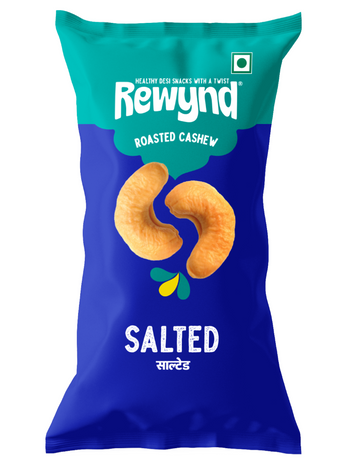Imagine this: It's been one of those days where everything that could go wrong, has. The traffic was a nightmare, your meetings ran over, and just when you thought you could catch a breath, your phone buzzes with another urgent email. Exhausted, you slump onto the couch, your mind racing a mile a minute. And then, almost like a siren call, you hear it - the rustle of a snack bag from the kitchen. Before you know it, you're knee-deep in a snack binge, seeking solace in the crunch and comfort of your favourite treats.
This scenario is all too familiar for many of us, a classic case of stress eating. It's a habit that sneaks up in moments of vulnerability, offering a fleeting escape from our worries with every bite. But here's the twist - what if we could turn this moment of weakness into an opportunity for wellness?
Adopt to 'Rewynd Lifestyle', a way of living and not just snacking for those looking to navigate the turbulent waters of emotional cravings with a healthier compass. With Rewynd's plethora of nutritious and delectably flavoured snacks, we're on a mission to transform stress eating from guilt-ridden binges into moments of mindful indulgence.
Let's undertake a journey to understand the whirlpool of stress eating and navigate towards the shores of healthier choices, with Rewynd Snacks as our trusty guide. Let's start with understanding stress eating in the first place.
What is Stress Eating?
Stress eating, or emotional eating, is when individuals eat in response to feelings rather than hunger. It's a coping mechanism to deal with negative emotions such as stress, boredom, sadness, or anxiety. Unlike physical hunger, emotional hunger urges us to seek solace in food, often leading to unhealthy choices.
The cycle begins with a stressor, leading to discomfort and a craving for immediate relief. Food becomes the go-to solution, providing a temporary escape and pleasure. However, this is followed by guilt and shame, which can lead to more stress and thus, the cycle repeats. Understanding this cycle is the first step in breaking free from it.
How to Identify if You Are a Stress Eater or Emotionally Eating?
Recognizing stress eating involves noticing the triggers and patterns in your eating habits. Ask yourself:
- Do I eat more when I'm stressed or emotional?
- Do I seek out specific foods (usually high in sugar or fat) during these times?
- Do I eat even when I'm not physically hungry?
- Do I feel guilty or ashamed after eating in response to stress?
Answering 'yes' to these questions may indicate a pattern of stress or emotional eating.
How to Break the Cycle and Make Healthier Choices?
1. Identify Your Triggers:
Understanding what prompts your stress eating is crucial. Is it work pressure, relationship issues, or boredom? Recognizing these triggers can help you address the root cause.2. Find Alternative Coping Mechanisms:
Instead of turning to food, find other ways to deal with your emotions. This could be exercise, meditation, journaling, or engaging in a hobby.3. Mindful Eating:
Be present during your meals. Focus on the taste, texture, and how you feel. Mindfulness can help distinguish between emotional hunger and physical hunger.4. Healthy Snacking:
Opt for healthier alternatives when you do need a snack. Rewynd Snacks offers a range of nutritious options that satisfy without guilt.5. Seek Support:
Sometimes, breaking the cycle of stress eating requires external help. Don’t hesitate to seek support from friends, family, or professionals.Breaking the cycle of stress eating and making healthier choices is a journey of self-discovery and discipline. It's about replacing the temporary comfort of food with lasting solutions to stress and emotions. With the right strategies and healthier snacking options from brands like Rewynd Snacks, it's possible to overcome stress eating and embrace a more balanced and fulfilling lifestyle.
FAQs
Stress eating is consuming food in response to emotional needs rather than physical hunger.
Stress eating is triggered by emotions or stressors, whereas physical hunger is a biological signal that the body needs nourishment.
Common triggers include stress, boredom, sadness, or anxiety.
Alternatives include mindfulness, exercise, and engaging in hobbies or activities.
Stock up on nutritious snacks, plan your meals, and find healthy stress management techniques.























































